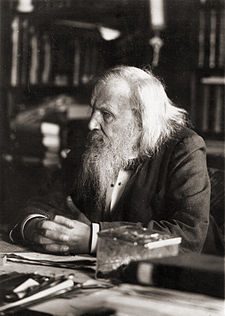We must expect the discovery of many as yet unknown elements-for example, elements analogous to  aluminum and silicon- whose atomic weight would be between 65 and 75.
aluminum and silicon- whose atomic weight would be between 65 and 75.
Certain characteristic properties of elements can be foretold from their atomic weights.
Elements which are similar as regards their chemical properties have atomic weights which are either of nearly the same value (eg. Pt, Ir, Os) or which increase regularly (eg. K, Ru, Cs).
The magnitude of the atomic weight determines the character of the element, just as the magnitude of the molecule determines the character of a compound body.
It is the function of science to discover the existence of a general reign of order in nature and to find the causes governing this order. And this refers in equal measure to the relations of man - social and political - and to the entire universe as a whole.
No law of nature, however general, has been established all at once; its recognition has always been preceded by many presentiments.
Pleasures flit by - they are only for yourself; work leaves a mark of long-lasting joy, work is for others.
The elements which are the most widely diffused have small atomic weights.
The elements, if arranged according to their atomic weights, exhibit an apparent periodicity of properties.
We could live at the present day without a Plato, but a double number of Newtons is required to discover the secrets of nature, and to bring life into harmony with the laws of nature.